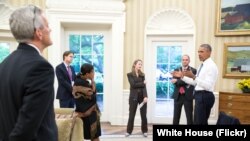Their BlackBerrys are still buzzing, day and night. For the moment, aides to President Barack Obama still have world leaders to worry about, distant wars to help manage and decisions to make that affect the nation.
All that will come to a crashing halt on Jan. 20, Inauguration Day.
Hoping to ensure that his staffers find decent jobs, Obama and his team have brought in representatives from Facebook, Instagram and other companies to offer insights into the job market. Officials from LinkedIn are helping White House staffers identify ways to market their skills.
And Georgetown University, not far from the White House, has designed a custom professional development program dubbed “Future44” - Obama is the 44th president - to teach Obama's political appointees how to position themselves for life after the White House.
“You go through a detox period,” said Michael Wear, who worked for Obama for four years on faith-based outreach. “It was like my brain, after so much time working incredible hours and having to be so attentive to so many inputs, I would be holding my glasses and asking my wife where my glasses were.”
Even before the election, few if any of Obama's aides were expected to stay for the next administration. Many are flat-out exhausted and anticipated that Hillary Clinton, if elected, would want to install her own team. But Donald Trump's upset victory foreclosed any possibility that any of the nearly 500 staffers will stick around.
For those who have dedicated years to Obama's mission, often missing out on holidays or family occasions, Trump's win and his promises to undo most of Obama's accomplishments were a demoralizing blow. And the fact that Republicans retained control of both the House and Senate means there will be fewer opportunities for Obama-era aides to move into other government jobs here.
At Georgetown, 271 Obama appointees have already gone through the Future44 program, provided at no cost thanks to an anonymous donor. Participants register for either four 2-hour evening sessions or one 8-hour “boot camp.”
“We designed this unique curriculum to help these staffers think through how to market themselves or market their competencies,” said Kelly Otter, dean of Georgetown's School of Continuing Studies.
Many outgoing White House staffers are expected to move to the San Francisco area and New York, places with high-tech jobs and cultural sensibilities that overlap with the culture in Obama's White House. Those staffers would be joining dozens of other former Obama aides who have gone on to work for Google, Amazon, Vice, Snapchat and similar companies that cater largely to millennials.
“There are a lot of mission-driven organizations here,” said Clark Stevens, who moved to San Francisco to work for AirBnB after working in the White House and the Homeland Security Department. “These are areas of innovation, and they're providing new solutions. That aligns in a lot of ways with the focus of the president.”
To help prepare staff for post-West Wing life, the White House has been hosting “digital brown bag” lunches about digital media and technological developments, involving both outside speakers and Obama staffers who worked recently at Google and other companies. Smaller sessions within specific departments have focused on making the transition from government to the private sector.
White House spokeswoman Jennifer Friedman said Obama had directed staff to keep working on his priorities full-speed until Inauguration Day, but was mindful that the end is a little more than nine weeks.
“The transition out of government is a reality for most appointees, which brings both excitement about prospects for the next chapter or a long-awaited chance to recharge batteries, and a keen awareness about a big, impending change,” Friedman said.
That change can be jarring for longtime staffers, and even a letdown. Ivan Adler, a headhunter at McCormick Group who specializes in government affairs, said most go on to work in one of two settings: firms, like consulting and lobbying agencies, or organizations like trade associations, think tanks and nonprofits.
“I tell everybody: You have to understand there's likely nothing you will do professionally that will have the same amount of excitement you've just gone through in the White House, unless you become a racecar driver or an astronaut,” Adler said.
For Wear, who left Obama's orbit in 2013 after the re-election, life after the White House involved starting his own consulting firm, then penning a forthcoming book called “Reclaiming Hope” about the intersection of faith and politics in the White House.
“I've been healthier since I left,” Wear said. “And I'm very much enjoying my life now.”




